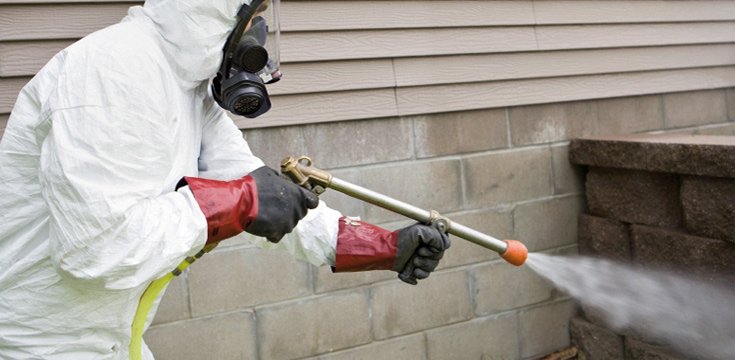Environmental Effect of Pest Control: Harmonizing Efficiency With Sustainability
The ecological impact of parasite control is an essential concern that calls for a fragile equilibrium in between achieving effectiveness in handling parasites and ensuring sustainability of our ecological communities. From the usage of harmful chemicals that leak right into our dirt and water to the unexpected consequences on non-target varieties, the effects of standard insect control practices are far-ranging.
Hazardous Chemicals in Pest Control
The application of unsafe chemicals in bug control presents considerable ecological and health and wellness threats that require mindful consideration and reduction approaches. Herbicides, pesticides, and pesticides are generally utilized to eliminate pests, yet their prevalent application can result in unplanned consequences. These chemicals can infect soil, water resources, and the air, impacting not only the targeted pests however additionally helpful pests, wild animals, and human beings.

To deal with these threats, integrated pest administration (IPM) techniques are being promoted as an extra lasting choice. IPM includes a combination of methods such as organic control, habitat control, and the targeted use of chemicals as a last resource (ant control marvinnc nc). By taking on an all natural approach to pest control, we can minimize the ecological and wellness impacts related to harmful chemicals while efficiently managing pest populations
Effect On Non-Target Species
Thinking about the unintended effects of insect control approaches, the effect on non-target types is a crucial aspect that needs extensive analysis. While bug control actions aim to target particular insects, various other organisms in the environment might be inadvertently affected. Non-target types, including useful bugs, birds, creatures, and even plants, can suffer straight or indirect harm from pesticide applications or organic control methods.
Pesticides can have lethal or sub-lethal effects on non-target types. As an example, insecticides designed to fight a particular insect parasite may hurt pollinators like bees or natural killers such as ladybugs. In addition, chemical residues can accumulate in the atmosphere, impacting non-target microorganisms with time. Likewise, organic control agents, if not species-specific, can present dangers to unexpected targets, disrupting the eco-friendly equilibrium.
To alleviate the influence on non-target species, integrated bug monitoring (IPM) methods that stress a holistic strategy to pest control are advised. These techniques prioritize using environmentally pleasant techniques, reducing damage to useful microorganisms while effectively managing pest populaces. Performing comprehensive threat assessments and monitoring the results of bug control initiatives are crucial action in safeguarding non-target varieties and advertising general ecological community health.
Dirt and Water Contamination
Unintentional ecological consequences of insect control methods prolong beyond affecting non-target varieties, with considerable ramifications for dirt and water contamination - termite control services. Pesticides, herbicides, and chemical fertilizers utilized in parasite control can leach right into the dirt and pollute groundwater, positioning a risk to both terrestrial and marine environments.
Water contamination is another important concern related to insect control methods. Overflow from farming areas treated with pesticides can lug these chemicals right into neighboring water bodies, affecting aquatic organisms and water quality. Pollutants in water resources can have significant effects, influencing not just marine life yet additionally human wellness via the intake of contaminated water or aquatic microorganisms. To mitigate soil and water contamination from pest control activities, integrated pest monitoring strategies that prioritize sustainability and minimize chemical inputs are essential.
Air Air Pollution From Chemical Usage
Exposure to airborne pesticides during agricultural applications presents a substantial concern for air pollution control measures. They can volatilize into the air and kind unstable natural substances (VOCs) and other air-borne contaminants when chemicals are splashed onto crops - ant control services. These chemicals can contribute to the development of ground-level ozone, a major part of smog that can have detrimental results on human health and wellness, plant efficiency, and overall air top company website quality. Furthermore, chemical drift, where pesticides are carried by the wind to unplanned locations, can cause the contamination of close-by communities and water bodies.

Techniques for Sustainable Parasite Control
In the world of agricultural methods, carrying out lasting pest control methods is extremely important for maintaining environmental equilibrium and guarding crop yields. Lasting bug control emphasizes making use of ecologically pleasant approaches to manage bug populaces efficiently while minimizing injury to non-target organisms and ecological communities. Integrated Pest Monitoring (IPM) is a widely taken on approach that integrates biological, social, physical, and chemical control methods to achieve long-lasting pest administration remedies.
Plant turning and diversification are additionally efficient techniques to interfere with pest life cycles and produce much less positive conditions for parasites to flourish. Ultimately, by incorporating these sustainable parasite control methods, farmers can achieve an equilibrium between pest administration effectiveness and ecological stewardship.
Verdict
In verdict, the ecological impact of bug control methods need to be thoroughly taken into consideration to balance performance with sustainability. Damaging chemicals made use of in insect control can cause soil and water contamination, air pollution, and damage non-target varieties - ant control services. It is crucial to execute lasting pest control techniques to lessen these negative effects on the atmosphere and advertise a much healthier community for future generations
By embracing an all natural approach to pest control, we can reduce the environmental and wellness influences associated with hazardous chemicals while successfully taking care of pest populations.

To reduce the air contamination caused by chemical use, it is crucial to embrace incorporated insect monitoring methods that prioritize the use of non-chemical parasite control techniques, such as plant rotation, all-natural killers, and resistant plant ranges. Lasting bug control stresses the use of ecologically pleasant methods to take care of pest populaces efficiently while lessening harm to non-target microorganisms and environments. Integrated Bug Monitoring (IPM) is an extensively embraced method that combines biological, social, physical, and chemical control methods to attain long-term insect monitoring remedies.
Comments on “Comprehensive Termite Control: Protect Your Property with Expert Services”